- Home
- Chaim Potok
The Gift of Asher Lev Page 2
The Gift of Asher Lev Read online
Page 2
I read that again and closed my eyes and saw a brief slide show of the words “if only we’re on the trail of the law of our own growth” and then went on reading until I read these words about Cézanne:
I know a few things from his last years when he was old and shabby and children followed him every day on his way to his studio, throwing stones at him as if at a stray dog. But inside, way inside, he was marvelously beautiful, and every once in a while he would shout something absolutely glorious at one of his rare visitors.
I closed the book. Cézanne an old man and children throwing stones at him as he trudges to his studio. The image persisted.
The flight dragged on. The plane was about half full, its interior dim, most of the shades lowered. Passengers sat watching the movie. I listened to the rhythmic revolutions of the two huge engines and the rushing streams of wind and saw ourselves miles above the earth in this sealed tubular craft sailing swiftly through the blue sky; the vision chilled the backs of my legs. Avrumel grew restive. I told him a story about the Rebbe in Paris during the war. Rocheleh coughed, but it was nothing; she had merely swallowed some water too fast. Devorah, working now by the overhead light on the manuscript of her children’s book, looked pale, apprehensive. From time to time she would raise her eyes from her work and gaze about anxiously. She would look at the children and at me, and return to her manuscript.
We crossed the coastline and banked toward Boston and New York. The captain came on the intercom and said a storm was moving into the New York area and we would circle over Connecticut for a while and if the storm did not run its course before we ran low on fuel we would set down in Philadelphia, refuel, and return to New York. I saw Devorah look up from her manuscript and stare into space and murmur words I could not hear.
We sat belted into our seats, the passengers still, the giant aircraft circling. Below us was a world of dark clouds menacingly shot through with silvery tints; above us, the pale-blue sky of the spring day. The engines suddenly changed pitch, and the captain came on the intercom and said we had been cleared for landing in New York. We entered the clouds and bucked and bounced and rode the air currents like a carnival roller coaster. I was certain Rocheleh would be ill, but she sat calmly through it all, reading about Alice and her Wonderland. Avrumel wanted to know if it was like riding a horse, and I told him I didn’t know, I had never been on a horse. Devorah sat very straight, her small chin rigid, her eyes closed. Then we were through the clouds and I could see water below, slate gray in the rain, and brown sodden earth and rows of private homes and cars on the wet roads. The ground tilted and rose swiftly toward us and the wheels bumped heavily on the runway and we lurched and slowed and then rolled on for a while and came to a stop.
After a moment, the captain told us that all the gates were in use, there would be a gate for us in ten minutes. Thirty-five minutes later, we rolled into a gate and disembarked.
I carried Avrumel. He clung to me. I felt his warmth and his slight weight and his cheek against my bearded face. Rocheleh walked alongside Devorah, her eyes behind her glasses taking in the long herdlike trek through corridors and the waiting lines at passport control and customs and the dense milling crowd outside. We started through the crowd.
“Papa,” Rocheleh called, and pointed.
A bearded young man stood along the edge of the crowd, carrying a large white sign on which was written in thick red letters: “Asher Lev.” People kept passing him and looking at the sign.
We steered toward him.
He was in his early twenties, deep-voiced, heavily built. He wore a dark suit, a tieless white shirt, and ritual fringes that dangled beneath his jacket.
“Asher Lev?”
I said yes, I was Asher Lev.
“The artist?” he said.
I nodded.
He said my father had asked him to meet us; we were two hours late. He told us his name was Binyomin. He shook my hand and said it was an honor to meet me, he had known my uncle, what a terrible loss, a tragedy for the entire Ladover world. He led us through the glass exit doors and across a wide busy road to a traffic island. He told us to wait, and hurried off.
Avrumel said he was hungry. Devorah took him from me and held him. “Soon,” she murmured in his ear. “Soon.” He held tightly to the drawing of the Shimshon doll. Rocheleh stared at the traffic in the rain and the churning crowds and people on the island rushing and cars loading up and pulling away and buses and vans stopping to let off and take on passengers.
A long blue station wagon drew up alongside the island and stopped, and the bearded young man jumped out. He held on to the brim of his dark hat with both hands as a gust of wind threatened to lift it from his head. We loaded our bags and climbed inside and moved into the traffic.
I sat in the front seat next to the young man and watched the terminal slide slowly away. An odd coldness settled upon me, a fearful and darkly textured sensation that was like a gust of fetid wind from the Other Side, and a curiously colored slide dropped into view, smoky reds and blacks beneath a dusky glaze, and I had a precise, stark, lucid presentiment that I would not be returning to this airport for a long time.
He took us along the Belt Parkway. It was raining hard. The highway was glutted with slow-moving afternoon traffic. The rain fell drearily from low clouds and washed across the road. Wipers arced rhythmically, and I saw the blurred faces of drivers through streaked windshields. Here and there the road was under repair. The traffic crawled and stopped and crawled on again. The car was old, its interior shabby. A used Styrofoam cup lay on the seat between me and the driver, on top of a folded Yiddish newspaper and a crumpled copy of the New York Times. He kept talking about my uncle. A true Jewish soul. A gift to us from the Master of the Universe. One of those who held the world together. A good heart. Always happy. A rare soul. One who binds up the wounds of the world.
We drove a long time in stop-and-start traffic. Avrumel, on Devorah’s lap, began to whimper. Rocheleh sat glassy-eyed, staring out her window at the traffic and the rain. Devorah looked haggard. Her wig was slightly awry. It was night for us. In Saint-Paul the children would have been long asleep, and Devorah and I might be sitting on our terrace with Max Lobe and John Dorman over drinks, talking. Suddenly the driver said the road was impossible; we would be better off going a different way. He took the next exit. “Longer, but faster,” he said.
We rode along a wide boulevard, crossed an intersection, and entered a narrow one-way street. Scraped and broken asphalt lay open to its dirt and crushed-stone layers. The station wagon creaked and groaned, its tires encountering with jarring shocks the rain-filled holes that pocked the street as in the aftermath of a cataclysm. Lining the broken, caved-in sidewalks were five-story red-brick houses, some with windows boarded, others open to the rain like eyeless sockets. One of the houses had suffered a fire; it stood scorched, its roof partially collapsed into its top floor, the center section of the floor deeply fissured, the cleft like an ax wound to the head, bricks littering the cement walk in front of the house. All through the street and around the houses and over the occasional empty lot lay the detritus of the neighborhood: beer cans, whiskey bottles, newspapers, dog droppings, a decaying mattress, an abandoned chair, an infant’s crib, a gutted television set—an infernal rubbish heap that was like the graveyard of all hope. The street was empty of people. An occasional car lay near a curb, doors open, wheels gone, stripped to its core: a metallic corpse abandoned to aboveground putrefaction. I turned in my seat and saw Avrumel asleep on Devorah’s lap and Devorah and Rocheleh staring at the blighted urban world through which we were passing. The driver, short in height and sitting low in the seat, kept craning his neck to spot the ruts and potholes. “Only a little more,” he muttered. “Patience, patience.” He hummed a light Ladover melody.
After two more blocks of bucking and lurching, he turned left into a wide two-way street, paved and glistening in the rain, and heaved a sigh. He glanced into his rearview mirror.
“Everybody okay back there?”
“We are well,” Devorah said in English.
He drove swiftly and skillfully through Brooklyn streets still unfamiliar to me and then into the fringes of my old world. Then we were deep into that world, and I saw Ladover Hasidim on the streets and newly renovated homes and new shops and the park-way torn up, huge machines scraping at its entrails and heaving up the raw reddish earth.
“They’re repaving this whole section of the parkway,” the driver said. “Months they’re working on it. New trees also they’ll put in.”
The rain had eased. He turned into a tree-bordered street and came to a stop in front of a red-brick ranch-style house. He switched off the engine.
“Here we are,” he said in a somber tone. “I wish I was bringing you home on a happier occasion. I’ll help you with your bags.”
He had parked beneath a leafless sycamore. Rain dripped from the branches onto the car. The late-afternoon air was gray and cool. Gusts of wind blew through the street and rippled the puddles and shook the rain from the trees. I helped Devorah out of the car. Avrumel, in deep sleep, clung to her. The driver was busy with the bags. Rocheleh gave me her hand and stepped from the car to the sidewalk, just as a gust of wind splattered rain onto her startled face. The door to the house flew open, and two tall dark-bearded men came hurriedly down the walk that divided the front lawn. They wore dark suits and dark hats and tieless white shirts. They came over to us and, without a word, took our bags and hurried back up the walk and into the house.
I thanked the driver.
“An honor,” he murmured.
Holding Rocheleh’s bony, fragile-feeling hand, I followed Devorah into the house.
My mother stood just beyond the doorway, inside the entrance hall. She embraced Devorah lightly so as not to waken Avrumel and pointed to the men who were carrying our bags through the hallway to the interior of the house. Devorah followed quickly behind them. My mother murmured, “Rocheleh, Rocheleh,” and bent down and held my daughter to her for a long time, her face against the face of the child, and I noted fleetingly how alike they looked—straight nose, wide eyes, small lips, high-boned cheeks. “Grandmother, it was a long trip, and I am very tired,” Rocheleh said in French. My mother responded in French: “But yes, dear child, of course. Everything is ready for you.” She looked at me and asked in Yiddish, “How are you, my son?”
“I am well, thank God, considering the circumstances. How are you?”
“How should I be, Asher? Your uncle’s death is a terrible tragedy.”
“Where is Papa?”
“Next door. They are making the final arrangements for tomorrow. The Rebbe himself will speak at the funeral. You look pale, my son.”
“It’s been a very long day, Mama.”
“Papa, I am very very tired and I would like to go to bed now,” Rocheleh said.
“I am so sorry,” my mother said. “You have just flown thousands of miles, and here I stand talking. Come along with me, dear child. Asher, your room is on the left, over there. Come, Rocheleh.”
“Good night, Papa.”
“Good night, Rocheleh. Remember to say the Krias Shema.”
“I always remember, Papa. Will Mama bring me my medicine?”
“I’ll remind her.”
They went off down the hallway and turned a corner.
I entered the room my mother had pointed to: twin beds in honey-colored wood, a desk, chairs, a dresser, beige carpeting, off-white walls bare save for a picture of the Rebbe over the desk, a large sliding glass door that led to a flagstone terrace and a length of wet lawn bordered by a tall juniper hedge and a towering mottled sycamore. I had not been in this house before. The apartment had been old and cramped: small rooms, a narrow hallway, two bedrooms, mine closetlike, its single window looking out on the cement paving of a back yard encumbered with garbage cans and hungry cats. This house, new, spacious, seemed filled with light even on this murky day of rain.
There was a noise behind me, a familiar tread: my father’s slightly limping stride, the lingering residue of the infantile paralysis he had sustained as a child in Soviet Russia. He entered the room and I moved toward him and he shook my hand: a powerful grip even in grief. He had not yet removed his coat and hat; they were stained with rain. Sorrow and shock clouded the dark and mesmerizing eyes. He ran a hand through the dense white length of his untrimmed beard and then across his forehead: long-familiar gestures of distress and fatigue. He spoke in Yiddish.
“The children are all right? I have not had a chance to see them. Your mother says they are asleep. Devorah looks very tired. How are you, Asher?”
“I’m all right. I’m so sorry about Uncle Yitzchok. Was he ill?”
“No. It was very, very sudden. He was in the living room of his house, he gave a little cough, and he was—he was gone. Your Aunt Leah Golda was with him, and some friends. One minute here, the next minute gone. God gives, and God takes. That is the way of the world, Asher. What a blow this is, what a tragedy. I cannot reconcile myself to it. My brother….” He closed his eyes and shook his head, and a tremor coursed through him. “The Rebbe will speak at the funeral in the synagogue. That is a great honor…. I cannot believe this is happening…. I should take off this coat…. An awful day outside; a terrible rainstorm we had earlier today. Your mother worried about all of you flying in such a storm…. I must take this off…. It is really good to see you and your family, Asher. Too many years. And they go by so quickly now. It is the only good thing that has come of this, that you and your family are here. This is not a time for conversation. We will talk when things settle down a little. You and Devorah should go to sleep. I know about jet lag.”
He stepped out of the room and into the hallway and was gone. The space he had occupied vibrated softly. A residue of his presence remained in the room, a palpable afterimage that faded only after some moments passed.
The bags had been set down at the foot of one of the twin beds. My attaché case was on the desk. I began to unpack.
Devorah entered the room.
“The children are asleep.”
“Did you remember to give Rocheleh her medicine?”
“Of course.” She took off her wig and stepped out of her shoes. She put the wig on the dresser. Without her shoes and wig, she looked diminutive. “Avrumel woke up and asked for Shimshon.”
“What did you tell him?”
“He fell back asleep before I could get a word out. How do you feel, my husband?”
“Very tired and very sad.”
“Do you think any good will come of this, Asher? Can God have a plan? That’s what I used to think when I was in that sealed apartment in Paris. That God had a plan, a big plan. Sometimes I would lie awake at night and try to guess what the plan was.”
“My plan is to shower and go to sleep, Dev.”
“Go ahead, my husband. I will unpack. But wouldn’t it be interesting if there was a plan to this? Wouldn’t it?”
“Absolutely. My uncle dies suddenly as part of some big plan. You’re more of a Hasid than I am, my wife.”
I headed for the bathroom and the shower.
Standing naked before the full-length mirror in the bathroom, I can barely see myself for the vapor that clouds the glass. Droplets cling to the wallpaper: lacy dogwood as in a rain. Pallid features, dark eyes, red hair and beard beginning to gray, narrow shoulders, white skin sheathing a scrawny frame down to the reddish triangle above the genitals, and then the legs, white, bony, all seen mistily, distorted, misshapen, through the fog of vapor thrown off by the hot, jetting water of the shower.
I lift my right arm and with my index finger trace slowly and with care the outline of my head and beard and then put in the locations of the eyes and nose and mouth. With my right index finger I draw the outline of my left shoulder and arm, and with my left index finger I draw the outline of my right shoulder and arm. I step back.
The drawing of me in the foggy mirror is awkward, doll-like, d
iminished, an ungainly semblance of myself.
Eighteen years before, I spent a night with my parents in the apartment where I grew up. I came out of the bathroom after a shower and went into my room. The phone rang. My mother tapped on my door. The call was for me. I went out into the hallway. The air was cool. I felt it cool on my face and the back of my neck, where the hair was still damp.
“Hello,” I said into the phone.
“You are Asher Lev?” a whispery, muffled voice said.
“Yes.”
“Asher Lev, the artist?” There was an cerie quality to the voice a hollowness, as if it were coming to me over a long tube from a great distance away. “You made the crucifixion paintings?”
“Who is this?”
“I will tell you who this is. Listen to me, Asher Lev.” A pause followed, strangely sinister. “I am the Angel of Death.”
Cold air brushed across the backs of my legs. Beneath the damp hair of my head my scalp tingled.
“By morning you will no longer be among the living,” the voice said. “You hear me, Asher Lev? By morning I will have taken back your corrupted soul. So perish the enemies of the Lord.”
The line went dead.
The phone in my hand was suddenly alive, pulpy, reptilian. I slammed it down, trembling, and returned to my room. Sitting on my bed, I felt soiled and thought I must take another shower, but I lay down instead and tried to sleep. I woke in the darkness of the early morning and thought I heard the phone ringing and an arctic presence in the room and the reeking stench of goatish breath. I climbed out of bed and walked in the chill night silence of the hallway to the bathroom and urinated and looked at myself in the mirror. That voice. Cold, menacing, faintly accented, sinister, like a messenger from the Other Side.
Now, on the night before my uncle’s funeral, I stand gazing at the drawing of myself in the bathroom mirror in my parents’ home, watching it slowly dissolve, dripping mist.

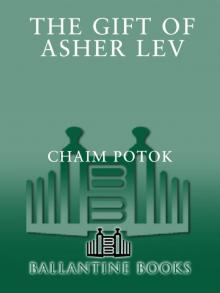 The Gift of Asher Lev
The Gift of Asher Lev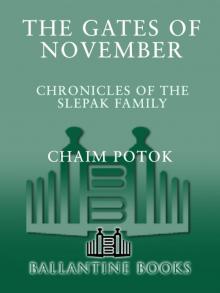 The Gates of November
The Gates of November In the Beginning
In the Beginning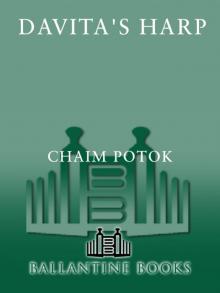 Davita's Harp
Davita's Harp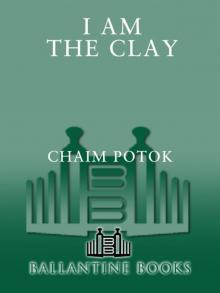 I Am the Clay
I Am the Clay The Promise
The Promise The Chosen
The Chosen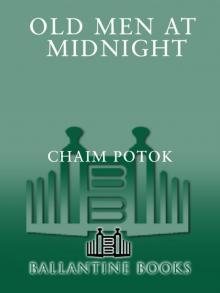 Old Men at Midnight
Old Men at Midnight My Name Is Asher Lev
My Name Is Asher Lev